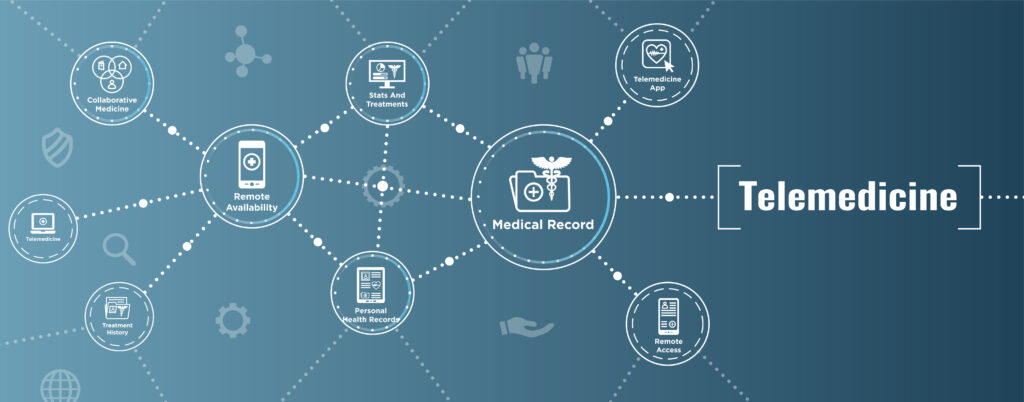The Rise of Digital Transformation in Healthcare
We are in the midst of a digital transformation in healthcare. Changing needs, spurred on by the global pandemic, have prompted a massive technological transformation in the healthcare industry. This transformation is encouraging new ways of approaching challenges and driving innovative problem solving. The change has been lightning fast and we are forced to adapt quickly to how we live and interact every day.
In every area of human life, there is currently a push towards transformation through the better and widespread use of digital technologies. In large part, this push has included the utilization of technology in the business and pursuit of healthcare, and general well-being.
Before now, digital technologies were already having an impact on healthcare – but the investment in change was not expedited. Now, the lessons learned during the global pandemic are also defining how healthcare evolves over the next decade.
In making a reality of these ambitions, stakeholders have placed their renewed focus on boosting the quality and affordability of healthcare services and predicting and preventing diseases instead of treating them at advanced stages. And it’s been interesting to see the trends and technology deployed towards that transformation.
Read on to find our detailed analysis of the rise of digital transformation in healthcare, and of the potential set to be unlocked in the foreseeable future.
What is Digital Transformation (DX)?
These days, “digital transformation” is more of an imperative than a buzzword. Of course, what that imperative is largely depends on who you are and to what healthcare system you belong.
The consensus is that it involves far more than just migrating manual processes to a digital environment. By and large, digital transformation involves the adoption of digital technology, but it also considers how the adoption changes products, processes, organizations and entire ecosystems.
In healthcare, it is taken as a building block of a patient-focused approach to care delivery. Deloitte defines it as the use of digital technologies to radically improve the performance or reach of an organization. For healthcare providers, that often means using effective technologies to streamline operations, understand what the patient requires, build loyalty and trust and offer a better user experience.
Ramifications of the digital transformation in healthcare
The above motivations underpin why the healthcare industry is undergoing its “Gutenberg moment.” The adoption of smart devices, big data, ubiquitous computing, and cloud networks are all combining to revolutionize healthcare beyond patient expectations. Even better, they are doing so with the exciting promise of lower costs and higher quality simultaneously.
Computers are replacing physicians for many diagnostic tasks and enormous data sets are giving us new means to attack conditions that have long been incurable. Shelter-in-place orders meant to counter a proficient contagion also facilitated a huge growth of telemedicine.
Meanwhile, the proliferation of sensors and AI have increased availability of real time monitoring, and the development of correlations of an individual’s data to health outcomes. Combining all these factors and other data such as genetic sequencing and the Electronic Health Record (EHR) is helping clinicians maximize the opportunity to predict adverse events in patients.
As the deployment of digital technology continues, healthcare providers are responding to pressure to evolve their services, strategies and products so as to flourish in an increasingly value-based healthcare system. In any case, the choice is removed from them, as more people are increasingly exercising agency and control over their health. Thus, any healthcare provider that wants to survive in today’s market simply must evolve.
Already, digital transformation has driven tremendous change across every link in the healthcare value chain. Innovations are driving efficiency and making providers better in every ramification of healthcare delivery including health education, staffing, scheduling, claims processing, compliance, care delivery, and patient experience.
According to the latest market research, players in the healthcare space are driving transformation efforts across this spectrum in three key directions, namely:
- Insights and Analytics (76%)
- Virtual Health Services (68%)
- Cloud (56%)
Insight and Analytics
Like in so many other industries, data is serving as the raw material for the digital transformation of healthcare – powering improvements to value, quality, cost, experience, and equity in care delivery. In essence, healthcare providers are using data to make better business and treatment decisions.
Through deployment of digital technologies like Artificial Intelligence, Machine learning, Internet of Medical Things (IoMT), and Big Data, providers are able to:
- Collect, store, access, share and move data efficiently and securely,
- Improve lines of communication,
- Lower risk of treatment,
- Predict trends,
- Facilitate scalability,
- Expedite diagnostic tasks, and
- Improve patient care, etc.
To make the most of these advantages, providers aren’t just collecting data, but also conducting analytics to glean useful information. They’re doing this by integrating third-party digital tools and patient-facing technology (i.e., wearable health trackers, digital glucometers, and pulse oximeters).
The insights obtained go a long way in setting up and socializing electronic health records (EHR). Today, about 96%of hospitals use electronic health record technology. Compared to 2007, when fewer than one in 10 American hospitals and physician offices used EHRs, it’s safe to say that the digitization of health records can be considered complete in 2022.
Machine learning, which depends on large aggregations of this data, is also playing a major role in healthcare. From helping to map deep neural networks, to improving disease identification and medical imaging, performing robotic surgeries – machine learning is driving innovative initiatives geared towards improving the quality of care in the industry.
If you’re building a platform or looking to expand in the healthcare space, exposing data insights and metrics will be crucial to the value of your product. By using various technologies – including cognitive computing, enterprise collaboration, business process automation, knowledge management, and cutting-edge development tools – i3solutions will provide you with solutions tailored specifically to your mission critical needs.
Virtual Health (Telehealth, Extended Reality)
Developments in the telehealth area were considered promising even before the pandemic. It has been possible for a long time to interact off-site with a doctor via video-conference or other means. Also, as far back as 2014, a digital health startup called Proteus was receiving hundreds of millions of dollars in investments for its sensor-enabled pharmaceuticals. Proteus has since gone bankrupt trying to navigate a then unfavorable environment.
Today, a new impetus is driving the telehealth market, ensuring that it has become an entire collection of rapidly developing technologies and products that includes specialized applications, wearable devices, implantable sensors, and cloud databases.
Through telehealth and connected technologies, it is increasingly possible to use your smartphone to get rapid test results from one drop of blood, monitor your vital signs both day and night, and use an artificially intelligent algorithm to receive a diagnosis without having to see a doctor, all at a small fraction of the cost. Even as regulations and payments for virtual care are solidified, we will never see a return to pre-pandemic 2% telehealth utilization.
In all, providers are latching onto tremendous opportunities in virtual care, so much so that it has fundamentally changed the industry’s expectations and operations. If you are a provider seeking to lead the charge to remove geographic limitations from healthcare, i3solutions is leveraging our unique set of assets, new and existing technologies, and core competencies to build reusable, scalable, and sustainable solutions for use in care delivery.
Cloud services
Cloud computing is proving to be advantageous for both healthcare providers and their patients. On the business side, Cloud computing has proven beneficial for cutting down operational expenses while allowing providers to deliver high-quality, personalized care. For patients, cloud services gives them access to their own healthcare data, facilitating their agency in decisions concerning their health. This ensures improved patient outcomes. Cloud computing is also propping up nearly all next-generation technological innovations being deployed in healthcare.
i3solutions is a renowned cloud healthcare solution provider. We understand the ins and outs of the industry and the technological impact of cloud computing. Our experts can help you with custom solutions that harness the power of Microsoft Azure, AWS, and Google Cloud to help you deliver the best care for your patients. Contact i3solutions today for help navigating the digital transformation in healthcare.
Leave a Comment




